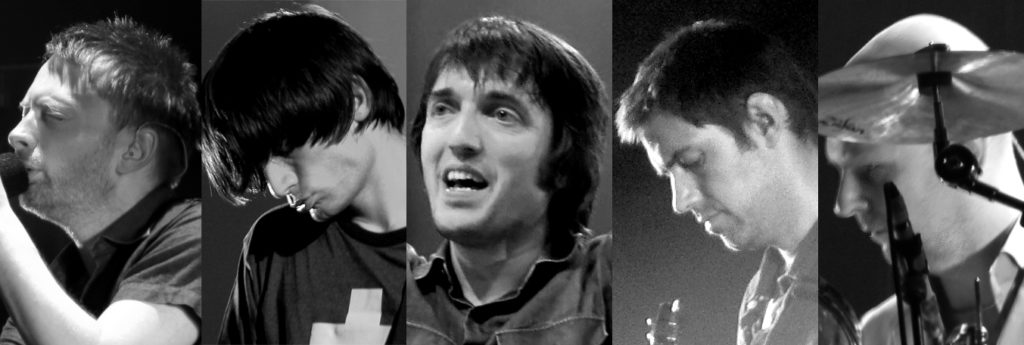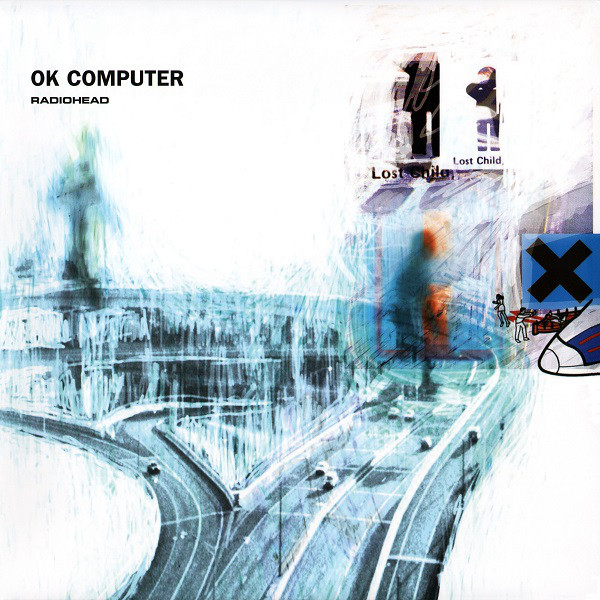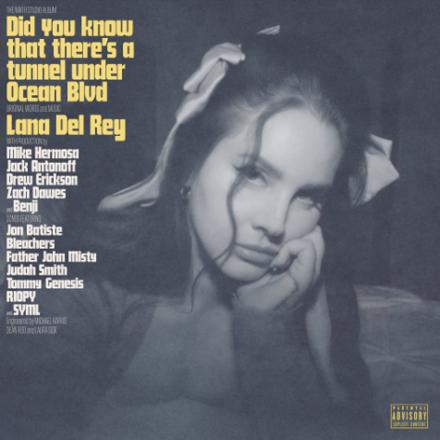OK Computer by Radiohead
Opinions belonging to Luke Hobika
Best tracks: “Paranoid Android;” “Let Down;” “Karma Police;” “No Surprises”
Worst tracks: “Subterranean Homesick Alien” (if I had to pick one)
Society is currently in the Information Age, a period characterized by the rapid innovation of technology. New products have allowed humans to achieve what once seemed impossible. Try and imagine the efficiency of communication before the cell phone. People had to memorize phone numbers? Now, with just a quick swipe or push of a button, a call can be made to someone across the globe. Transportation, security, and medicine represent a minority of areas that have also flourished as a result of this age. Given these advancements, it’s easy to overlook the harms that technology poses toward humans. How does this age affect how humans interact with the world? With each other? With themselves? In 1997, far before the hectic time in which the world exists, alternative rock band Radiohead disassembled this growing lifestyle and its consequences on their album, OK Computer.

Before the release of OK Computer, the public did not recognize Radiohead as a band that held a distinctive sound. Rather, the listeners saw them as a blend of countless other bands of the dying grunge-rock genre. Pablo Honey, their first studio album, is a carbon copy of what you would expect from a group of teenagers in a garage loosely throwing together what they deemed as “rock music.” While their second album, The Bends, advanced the band’s capabilities with a broader soundscape and more introspective lyrics, the band still hadn’t adopted a sound of their own.
Individually, each of OK Computer’s twelve tracks paints a particular narrative, yet collectively they do not tell a conceptual story (like Pink Floyd’s The Wall does). However, the themes of each track and their instrumentals end up overlapping with each other to confirm the overarching conflict of the album: technology vs. humans.

Across every track, the context of the lyrics applies to topics like transportation, technology, anti-capitalism, and insanity. “Airbag,” the album’s opening track, describes the ironic relationship technology can have with humans. Thom Yorke, the band’s lead vocalist, gives thanks to the technology of an airbag for saving his life after getting into an accident, an event for which technology was also responsible. Further on, the band comments on the detriments that technology brings to social interactions of today, in particular, Generation Z. “Don’t get sentimental/It always ends up a drivel,” Yorke admits on the multilayered “Let Down.” Ultimately, some people are dismissing their own feelings of distress in fear that their problems will be exposed to the public. The fast-paced nature of life which accompanies this trend then comes out on “The Tourist,” on which Yorke repeatedly stresses the phrase “Slow down.” Beyond criticisms of technology, the turbulent “Electioneering” shifts the tone of the album politics. Concerning the 1990’s Poll Tax Riots of Great Britain, the song does not hesitate to undermine what the band sees as utter corruption within the government, mocking politicians with lyrics like “It’s just business, cattle prods and the I.M.F/I trust I can rely on your vote.”
The obvious shifts in Yorke’s vocals are yet another aspect of this album that advances its dystopian aim. The unconventionally structured “Paranoid Android” starts with Yorke delivering unthreatening vocals. Eventually, he loses his composure, violently screaming moments before a sudden shift back to tranquility. Again, on “Climbing Up the Walls,” a skeletal instrumental and Yorke’s soothing vocals gradually intensify into abrasive production with gritty cries. Moments like these elicit a feeling of hysteria, unable to control the reigns of oneself.

Most impressively, Radiohead innovates OK Computer through how they experiment with the relationship between its vocals and soundscapes. By the end of “Karma Police,” the steady guitar strums and catching baseline that occupied the majority of the track are suppressed by a mixture of a distorted electronic guitar and synthesizer. Now driven by the command of a computer, the album segues into “Fitter Happier.” The song’s message zeroes in on modern society’s obsession with conformity, keeping up appearances, and maintaining relationships with others that are already artificial. While these issues pertain to humans, a text-to-speech voice of an early model of the MacIntosh computer narrates the song. The irony that was established on “Airbag” continues here with the narrator being an artificial voice — a text-to-speech voice of an early model of the Macintosh computer. Having the computer recite lines like, “Now self-employed/Concerned, but powerless/An empowered and informed member of society, pragmatism not idealism/Will not cry in public,” is truly haunting. After all, the subjects that the track discusses are partially perpetuated by society’s growing relationship with computers.
It’s difficult to admit the raw truth to ourselves when it turns out that there comes an asterisk with what we see as something pushing us toward a better tomorrow. OK Computer runs on this typical behavior of humans by exposing to us the dark side of the technology that ever so slowly consumes us. The radical musical conventions are off-putting at the surface of the album. However, through disassembling the machines of society that operate the world, OK Computer unearths the true society in which we are living.




































